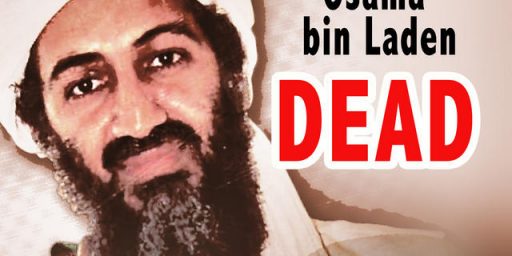DIAGNOSING AL QAEDA
RAND has an interesting discussion by that title on their website. They discuss the origins and nature of the network; whether it will survive if Osama is/has been eliminated; and several other interesting issues.
Greg Treverton is alone among the panelists of not being particularly worried about AQ acquisition of WMD:
Sure, if al Qaeda were handed a nuclear bomb, it might well use it. But the technology is not as easy as is sometimes portrayed. More to the point, as we wrote in a 1995 assessment when I was in the government, terrorists can do plenty of damage with “conventional” weapons, like 9-11’s airplanes. So neither al Qaeda nor other terrorist organizations really need to go to the bother of trying to get nukes or biological weapons (chemical weapons are not a good terrorist weapon). The one reservation I have about my guess is that there is a kind of escalation in violence. 9-11 was shocking, but a repeat would be less so. So there may be an incentive for terrorists to look to the next level of “stun” value.
Still, all the panelists are vehement that AQ, and indeed international terrorism collectively, are far less threatening than 20th Century threats like Hitler and Stalin. Bruce Hoffman says,
I think the parallel drawn between radical Islam, much less al Qaeda and bin Laden specifically, with Nazism and communism is not only facile, but dangerous. To date, neither al Qaeda alone nor in combination with its many associated and affiliated organizations (e.g., Jemmah Islamiya, al Ittihad al Islamiya, etc.) has come even remotely close either to causing the untold millions of deaths or showing themselves capable of engaging in the systemic state genocide engineered by Hitler and Stalin.
It is not only inappropriate to make such comparisons, but unproductive: since such parallels play precisely into the far-reaching and disquieting psychological repercussions that terrorists hope to achieve in their target audiences. Such assertions inadvertently inflate the terrorists’ power and capabilities and play precisely to the fear and intimidation they hope to instill in their enemies. Beyond any doubt, al Qaeda and radical Islam are among the most serious threats to U.S. national security that we face today. But at the same time we have to keep that threat in perspective and think about our adversaries rationally and soberly if we are truly to be effective in ensuring their defeat.
Brian Jenkins adds,
We must keep in mind that 60 million people–soldiers and civilians–died in the two world wars that were fought during the first half of the last century. When it comes to sustained, organized slaughter, the “civilized” nations cannot easily be matched. These wars were driven by diverse ideologies–nationalism, fascism, and communism. Between 5 million and 10 million people have died in the wars of the past quarter century. Bin Laden and like-minded fanatics have killed thousands. Terrorists create spectacular tragedies, but they don’t yet imperil the republic.
I have long subscribed to the notion that even those we label terrorists are subject to self-imposed constraints. Violence beyond a certain point is counterproductive. It threatens group cohesion, alienates the terrorists’ perceived constituents, and provokes reactions that their organizations seldom survive. True, as my colleagues often remind me, these constraints are not universal or immutable. Believing they have the mandate of God, terrorists subscribing to ideologies drawn from religion are less constrained by conventional morality or assessments of personal risk. But al Qaeda and its affiliates are not monolithic institutions; they are complex systems depending on tolerance and support.






This is precisely why I believe the “war on terror” should be a “police action on terror”. We can discuss humanitarian missions to overthrow brutal regimes but we should not be conflating the idea of a police action and a war. Doing so is not just “a harmless idea”, but something that is exceedingly dangerous for us to do.
Yeah!- Those symantics could put an eye out!
John: If I’m understanding your distinction correctly, I largely agree. But I’m not sure the two are mutually exclusive. Regardless of one’s views on Iraq, for example, most agreed that the war with Afghanistan’s Taliban regime was both necessary and justified. In a non-permissive environment, use of force is going to be necessary sometimes. In the aftermath of that force–or, in a more permissive environment–the use of a constabulary/police-type force will be required.
Who cares what it is called?
LBJ had his War on Poverty, We have a drug war, war on crime etc etc etc
None of that matters.
Are we killing/capturing the bad guys?
Yes.
Then we are doing the right thing.
You can call it whatever makes you happy.
P
Hey, I agree with you on Afghanistan. My only bone of contention there is that there was insignificant followup as evidenced by the reemergence of the Taliban. Good idea, extremely bad follow through. But Iraq was a stupid thing to do strategically. And as to you Paul, I’m afraid that your simplistic mind cannot comprehend that one can still be doing minor things right and still be missing the big picture. Your view is like someone wandering around a garbage dump and saying “See? I found a piece of Kleenex and I picked it up. See how good I am?” If you focus on doing number 235 on the list of “top 500 things I need to do to fight terrorism”, then you are being a STUPID IDIOT even though you are, technically, still doing something on the list. But I guess you don’t seem to have an idea of priorities and such. Rather, it’s all the same to you as long is it’s on the list.
Quite the contrary John…
You take the opportunity to bash Bush over semantics that mean nothing. Bush has the “big picture” that you lack.
He is working on the whole middle east. And if looked at honestly, he has made an incredible amount of progress. Iraq was a major success. But of course you can’t admit that for partisan reasons so you argue semantics. You try to say he is succeeding but doing it in the wrong order… really….
In fact the term “war on terror” you deride is an attempt to give the citizens the “big picture” that this goes beyond Bin Laden. He has said on any number of occasions that this is an ongoing struggle that will take years if not decades.
Yet you (inexplicably) bash him for not saying this while he is saying it.
That is why I say you have lost touch with reason.
Paul
When you can make a reasoned point and not spout the indymedia whacko talking point of the day, I will be able to take you more seriously.
‘s cool! Just like on the 3rd grade playground.
So Paul, pop question: There’s a wolf currently attacking you and a wolf you see circling towards you 5 miles away, which do you attack first? Bonus question: There’s another wolf pack 40 miles away in a canyon thinking about getting some food. Do you attack them first, based on a more grand strategy of taking care of the wolf problem once and for all?
John
Pop quiz…
How many terrorists have attacked us on U.S. soil since 9/11?
Guess all the right wolves are being handled huh?
If we had 10 terrorist attacks while our troops were elsewhere you would have a valid point. But we have not had these attacks so you have no point.
By your rational after Dec 7, 1941 we would have only protected Pearl Harbor. Luckly, the Democrat in office at the time knew better. If only the Dems today could figure that out.
Paul
and btw—
You argue in your second post that:
a) Bush does not get the big picture and is only doing the small stuff
But in your last post you argue that:
b) Bush is focusing on the big middle east picture when he should be focusing on the threats that are closer to us.
Now considering no rational person would argue 2 contradictory things, would you please pick one and stick to it?
Unless of course your whole point is just to bash Bush at every opportunity no matter what the rational… If that is what you are doing…. carry on.
Paul
What an aqua maroon! You’re selling Shark Repellent. See? No sharks around. Must be a deal! Read up on the statistics of terrorist attacks in the US. And I just love the allusion to Pearl Harbor. Man, just READ the article this post refers to. As to your second comment, you are just mixing your metaphors. Nice straw man, though. Too bad it doesn’t scare the crows.